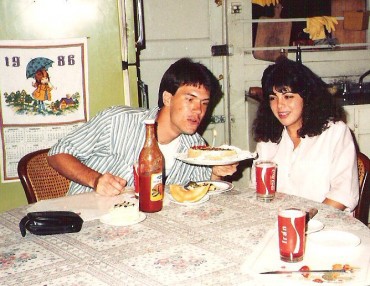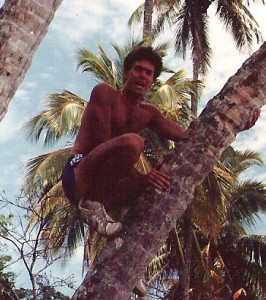
I had never intended to go abroad when I first stepped foot on campus. In fact, it never had entered my mind. But I had always, at some point, intended to declare Spanish as my minor.
The fall of my sophomore year, in a class called “Spanish Conversation,” a junior not enrolled in the class appeared as a guest of the professor, and under his arm was a slide projector. (For those of you under 35, a slide projector was a circular-shaped contraption that would show photos that had been converted to slides, to be projected onto a big screen.) This student was there to hype up the university’s spring semester program in Costa Rica.
The living quarters at my host family’s house.
I was enthralled. In a matter of minutes I knew I had to sign up for this. Except, there was one problem: I was living off-campus and was tied into a lease for the year. Oops.
Fast forward one year: On the second day of classes, completely unannounced, I appeared at the door of the Costa Rica program’s advisor, a veteran Spanish professor with whom I was familiar. Seated across from him was a gray-bearded fellow I didn’t recognize. I was quickly informed that this gent was the new trip advisor, Dr. M. The profs were impressed by my enthusiasm (heck, the trip wasn’t until February, and here I was wanting to sign up in the last week of August), and enrolled me in the program.
By January there ended up being thirteen of us in the program, a small number that actually almost caused the trip to be canceled. We all were placed with host families for the three and a half months. My host family’s house certainly had the best location of the thirteen — a ten minute walk to campus at the University of Costa, and a ten minute to downtown San José, the capital city — but my family was also the least well-to-do.
Celebrating my 21st birthday with my host family.
Which brings me to an important point: If you come from a comfortable existence, and such means a lot to you, carefully consider any decision to study abroad, especially in the Third World. There will be some, maybe a lot, of culture shock. Granted, in my case, Costa Rica is fairly well developed for a (supposedly) Third World nation, and even though I had prepared myself for it, I “suffered” my share of the shock.
For instance, there was no hot water tank in the house. Hot water was achieved through the use of a “heating coil” attached to the shower head. Unfortunately, these coils were expensive and last only about two weeks. Thus, for the vast majority of my stay, I had to bathe in cold water.
During the overnight hours I could hear “crunching” noises in the walls. I soon learned these were due to an infestation of some of the largest cockroaches you’ll ever encounter anywhere. Check out this video — I dealt with this very issue from time to time. In fact, I had to make sure the sleeves of shirts and jackets were clear of these critters before putting them on. I never had them crawling on the bed while I was asleep, thankfully; however, I learned to keep a small light on to keep it that way.
The other insect menace was mosquitoes. For some reason, most ticos (as Costa Ricans refer to themselves) do not believe in putting screens in their windows. (This remains true to this day.) Thus, at night, it was necessary for me to light, in my bedroom, mind you, an “espiral.” This is basically sort of a Citronella-type spiraled candle whose smoke acts as a mosquito repellent. I also had to sleep with a sheet pulled over my entire body, with a small breathing space left open for my nose and mouth.
Visting Valle Orosi. Costa Rica’s climate and scenery are incredible.
If I appear to be making this all seem an overly negative experience, this is certainly not my intention at all. Again, I merely am demonstrating aspects of culture shock.
My host family was absolutely terrific. It consisted of a mom and dad, one son, three daughters, and a cousin. One of the daughters had just had a baby a few days before my arrival. It was a crowded house, but an incredibly fun and loving one. Oh, and no one in the house spoke English.
Which is really the point, after all, right? I was there to learn the lingo. I had had four years of high school Spanish, and was now officially minoring in it at college. But it’s one thing to cobble together a sentence or two in Spanish class; it’s another thing entirely to be immersed into a country that speaks the language.
People facing such an immersion note one of two major difficulties: the speaking aspect, or that of listening. I fell mostly into the latter category. It was incredibly mentally exhausting having to focus in on what people were saying so that I could understand what the heck was going on. The first couple of weeks abroad my brain was fried by dinner time.
About a month into the semester, all thirteen of us in our group experienced a very weird event within days of each another: we had our first dream where everyone in it spoke Spanish. This was an indication that we were becoming fluent in the language, meaning we did not have to think about what we wanted to say, or, like myself, concentrate on what others were saying to me. It was coming naturally, now.
Some of us in our group were a bit uneasy going in to the trip — this was the mid-1980s, after all, and there was a civil war raging in Costa Rica’s neighbor to the north, Nicaragua. There, the governing leftist Sandinistas (FSLN) were battling the US-backed Contras, and there was a bit of controversy as Costa Rica was accused by the former of assisting the latter with resources and territory for bases. On the University of Costa Rica campus, Costa Ricans debated the conflict, and Cold War-era issues in general. Thankfully, ticos’ attitudes towards Americans were (and are) very positive, unlike those in many other Latin American countries.
Despite such pro-American views, there were two incidents which spooked our group, and one of those, yours truly, in particular. First, there was a hand grenade attack on the US embassy in downtown San José about half-way through our stay. Our parents were frantic in their phone calls upon hearing this news; however, we did not find out about the attack until the next day. We were a bit wary of walking the streets for a short time afterward, and the attack served as a catalyst for the US to relocate the embassy to a more easily guarded suburban location a few years later.
The second incident, which took place closer to the end of our stay, was revealed when I had exited my house on the way to campus one day. Someone had spray-painted “Reagan Terrorista” on the wall across the street, complete with a huge accompanying swastika. My heart began racing as I wondered if this was just someone making use of ample wall space … or some Sandinista sympathizers knew an American was living right across the street! (It must have been the former as thankfully no other incidents materialized.)
Attempting to nab a coconut at one of CR’s phenomenal beaches.
The people of Costa Rica (again, “ticos” as they call themselves), are some of the friendliest and most hospitable you’ll find anywhere. They’re justifiably proud of their little nation: since 1948, monies slated for military purposes have been funneled into education. As such, the country’s literacy rate is over 95%. Costa Rica has been dubbed “The Switzerland of the Americas” for its large, successful middle class (unusual for a Latin American country), lack of armed forces, neutrality in regional conflicts, and for its prowess in diplomatic matters. (Former president Oscar Arias won the Nobel Peace Prize in 1987 for his efforts in resolving Central American conflicts.)
So, why was this semester abroad worth it?
Besides becoming fluent in a new language, our university group obtained a whole new perspective in viewing world events … including those at home. We also discovered a new respect — and gratitude — for what we here in the United States have. If you’ve never traveled outside of the US, it becomes entirely too easy to take for granted how very comfortable our everyday living is, even compared to other “First World” countries (I’ve been to Europe, too, so this isn’t just a casual comment!).
Understanding where other populations — indeed, most everyone on the globe — come from in their opinions and interpretations of issues / events can only serve to aid us in reaching consensus … and commonality.
Often we hear of “The Ugly American” — those from the US who travel abroad and act in a ridiculous and preposterous manner. They are full of arrogance and conceit, wondering why other countries aren’t like the ours, and possess a mocking attitude as a result. I certainly encountered some of these folks during my semester abroad, and many more since, unfortunately.
Coming from the most powerful nation on Earth can often lead one to conclude that its ways of doing things are beyond reproach. Even our “diplomats” aren’t immune; Vice President Joe Biden, during one of his (Delaware) Senate campaigns, once ran a radio ad mocking his opponent’s view that the US should investigate changing to a Social Security system akin to that of Chile. The condescending tone of the ad — “Is THIS who were to take advice from — CHILE??” — was incredibly offensive. As if no other nation, especially (gasp!) and Third World one, could conceive of something better than what we do or have.
Come January, my daughter, now a college junior herself, will take part in the study abroad experience. She’s heading to England for the five weeks of her winter session. I hope she will appreciate her time overseas as much as I did, and will remember it as fondly as I do in the years to come.
Dave Huber is an assistant editor of The College Fix. In addition to the college spring semester of 1986, he has visited Costa Rica in 1988, 1989, 1992, 1995, 1999, 2002, 2005, and 2009. You can follow him on Twitter @ColossusRhodey.
Like The College Fix on Facebook / Follow us on Twitter
UPPER LEFT IMAGE: UCLA screenshot/Flickr










Please join the conversation about our stories on Facebook, Twitter, Instagram, Reddit, MeWe, Rumble, Gab, Minds and Gettr.